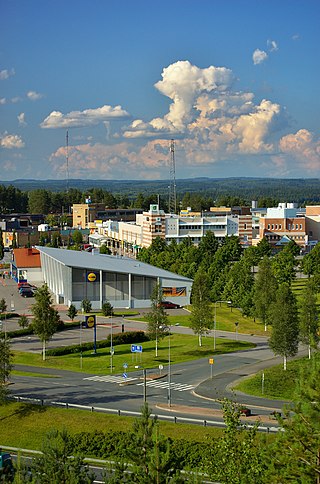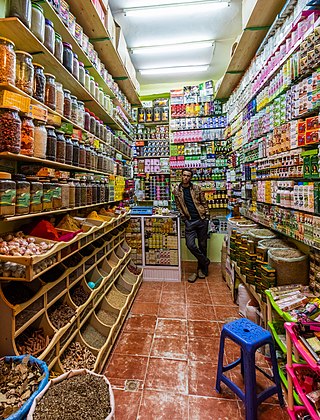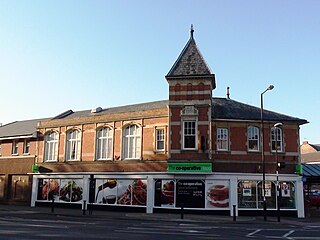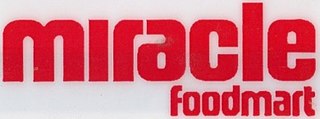Related Research Articles

A supermarket is a self-service shop offering a wide variety of food, beverages and household products, organized into sections. This kind of store is larger and has a wider selection than earlier grocery stores, but is smaller and more limited in the range of merchandise than a hypermarket or big-box market. In everyday U.S. usage, however, "grocery store" is synonymous with provision store or supermarket, and is not used to refer to other types of stores that sell groceries.

Asda Stores Ltd. is a British supermarket chain. Its headquarters are in Leeds, England. The company was founded in 1949 when the Asquith family merged their retail business with the Associated Dairies company of Yorkshire. It expanded into Southern England during the 1970s and 1980s, and acquired Allied Carpets, 61 large Gateway Supermarkets and other businesses, such as MFI Group. It sold these acquisitions during the 1990s to concentrate on the supermarkets. It was listed on the London Stock Exchange until 1999 when it was acquired by Walmart for £6.7 billion. Asda was the second-largest supermarket chain in the United Kingdom between 2003 and 2014 by market share, at which point it fell into third place.

Retail is the sale of goods and services to consumers, in contrast to wholesaling, which is sale to business or institutional customers. A retailer purchases goods in large quantities from manufacturers, directly or through a wholesaler, and then sells in smaller quantities to consumers for a profit. Retailers are the final link in the supply chain from producers to consumers.

A grocery store (AE), grocery shop (BE) or simply grocery is a store that primarily retails a general range of food products, which may be fresh or packaged. In everyday U.S. usage, however, "grocery store" is a synonym for supermarket, and is not used to refer to other types of stores that sell groceries. In the UK, shops that sell food are distinguished as grocers or grocery shops.
Loblaw Companies Limited is a Canadian retailer encompassing corporate and franchise supermarkets operating under 22 regional and market-segment banners, as well as pharmacies, banking and apparel. Loblaw operates a private label program that includes grocery and household items, clothing, baby products, pharmaceuticals, cellular phones, general merchandise and financial services. Loblaw is the largest Canadian food retailer, and its brands include President's Choice, No Name and Joe Fresh.

A hypermarket is a big-box store combining a supermarket and a department store. The result is an expansive retail facility carrying a wide range of products under one roof, including full grocery lines and general merchandise. In theory, hypermarkets allow customers to satisfy all their routine shopping needs in one trip. The term hypermarket was coined in 1968 by French trade expert Jacques Pictet.

Woolworths Group Limited is an Australian retail company headquartered in Bella Vista, Sydney, with extensive operations throughout Australia and New Zealand. It is the largest company in Australia by revenue and the second-largest in New Zealand.
Pathmark is a supermarket brand owned by Allegiance Retail Services, a retailers’ cooperative based in Iselin, New Jersey, USA. Pathmark currently has one location in East Flatbush, Brooklyn, New York, which it has operated since 2019.
A discount store or discounter offers a retail format in which products are sold at prices that are in principle lower than an actual or supposed "full retail price". Discounters rely on bulk purchasing and efficient distribution to keep down costs.

ICA Gruppen AB (publ) is a Swedish retailer franchise with a focus on food and health. The group also owns a bank, real estate division and a pharmacy chain.

Zayre was a chain of discount stores that operated in the eastern half of the United States from 1956 to 1990. The company's headquarters was in Framingham, Massachusetts. In October 1988, Zayre's parent company, Zayre Corp., sold the stores to the competing Ames Department Stores, Inc. chain, and in June 1989, Zayre Corp. merged with one of its subsidiaries, The TJX Companies, parent company of T.J. Maxx. A number of stores retained the Zayre name until 1990, by which time all stores were either closed or converted into Ames stores. The TJX Companies, which also owns Marshalls, HomeGoods, and Sierra, is still in operation as of 2022.

A big-box store is a physically large retail establishment, usually part of a chain of stores. The term sometimes also refers, by extension, to the company that operates the store. The term "big-box" references the typical appearance of buildings occupied by such stores.
In the Republic of Ireland, the retail sector provides one of the largest sources of employment in the economy, representing over 12% of the workforce. As of 2017, approximately 40,000 wholesale and retail businesses employed almost 280,000 people in Ireland, with the Department of Enterprise, Trade and Employment reporting that 90% of these businesses were Irish-owned.

A consumers' co-operative is an enterprise owned by consumers and managed democratically and that aims at fulfilling the needs and aspirations of its members. Such co-operatives operate within the market system, independently of the state, as a form of mutual aid, oriented toward service rather than pecuniary profit. Consumers' cooperatives often take the form of retail outlets owned and operated by their consumers, such as food co-ops. However, there are many types of consumers' cooperatives, operating in areas such as health care, insurance, housing, utilities and personal finance.
Trak Auto Corporation was an American retail chain specializing in automotive parts and accessories based in Landover, Maryland. Founded by Robert Haft in 1979, at its peak in 1993 it operated 333 stores around the United States under the Trak Auto, Super Trak, and Super Trak Warehouse concepts. A declining market, stiff competition, and management problems led to a steep decline and bankruptcy, with its remaining stores acquired by and converted to Advance Auto Parts in 2002.

Miracle Food Mart was a supermarket chain in Ontario, Canada, owned by Steinberg's, a Quebec-based retailer in the 1970s and 1980s.
Dominick's was a Chicago-area grocery store chain and subsidiary of Safeway Inc. Dominick's distribution center was located in Northlake, Illinois, while its management offices were located in Oak Brook, Illinois.

Retailing in India is one of the pillars of its economy and accounts for about 10 percent of its GDP. The Indian retail market is estimated to be US$ 600 billion and one of the top five retail markets in the world by economic value. India is one of the fastest growing retail markets in the world, with 1.2 billion people.
The retail format influences the consumer's store choice and addresses the consumer's expectations. At its most basic level, a retail format is a simple marketplace, that is; a location where goods and services are exchanged. In some parts of the world, the retail sector is still dominated by small family-run stores, but large retail chains are increasingly dominating the sector, because they can exert considerable buying power and pass on the savings in the form of lower prices. Many of these large retail chains also produce their own private labels which compete alongside manufacturer brands. Considerable consolidation of retail stores has changed the retail landscape, transferring power away from wholesalers and into the hands of the large retail chains.
Federated Group was an American chain of consumer electronics retail stores with 67 stores in California, Texas, Arizona, and Kansas. The company was founded by Wilfred Schwartz in 1970 and opened the first deep discount consumer electronics "superstore" in the United States. In 1987, Federated Group was the fourth-largest discounter of consumer electronics in the U.S. Its company headquarters were in City of Commerce, California and later in Sunnyvale, California. Federated Group was sold in 1987 to Atari and sold again in 1989 to Silo.
References
 This article incorporates text from this source, which is in the public domain . Country Studies. Federal Research Division. - Japan
This article incorporates text from this source, which is in the public domain . Country Studies. Federal Research Division. - Japan